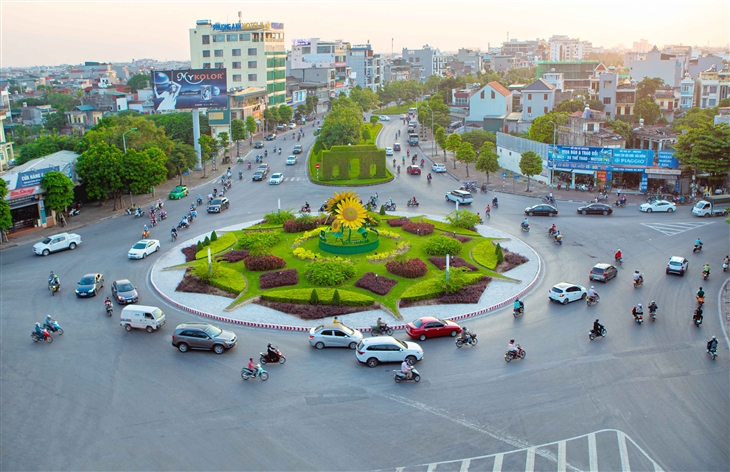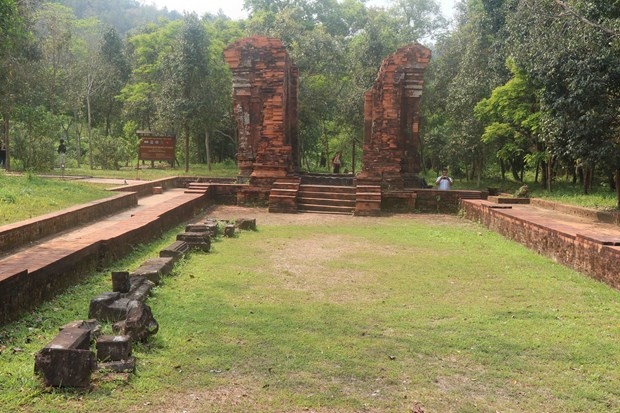Support teaching to build a stronger ASEAN community
Friday, February 17,2017AsemconnectVietnam - After launching in November 2015, the Association of Southeast Asian Nations or ASEAN Community now has to focus on increasing regional integration across all its three pillars: the ASEAN Economic Community; the ASEAN Socio-Cultural Community; and the ASEAN Political-Security Community.
Various ASEAN integration initiatives have been focused on increasing economic integration, looking at how to narrow trade barriers for goods and services and how to bridge the development gap between ASEAN member states in the 1990s and 2000s respectively.
Furthermore, in the 2000s there has been an increased focus on the movement of business people, experts, professionals, and skilled labour and talent as part of the ASEAN Framework Agreement for the Integration of Priority Sectors.
Since 2005, the ASEAN has started adopting mutual recognition agreements or MRAs for services. To date, there are MRAs and-or MRA frameworks covering eight service industries, namely engineering, nursing, architecture, surveying, medicine, dentistry, accounting and tourism.
In spite of the importance given by ASEAN to education, however, there has been no discussion on an MRA for Teaching Services.
Adopting an ASEAN MRA for Teaching Services, which should cover all levels of the education continuum, would support ASEAN community building, contribute to the achievement of the United Nations 2030 Sustainable Development Goals, and enhance quality and respect for the teaching profession.
ASEAN community building
Education provides a powerful platform for identity formation, inculturation, raising cultural awareness and building regional affinity.
The youth of today are the future leaders and citizens of ASEAN member nations and will play a significant role in consolidating a rules-based, people-oriented and people-centred ASEAN Community, whose motto happens to be “One vision, one identity, one community”.
As such, increasing teacher and academic mobility within the ASEAN region facilitates enhanced awareness and understanding of ASEAN member nations’ cultures, traditions and practices for both mobile teachers and academics and their students.
It also facilitates building long-lasting friendships and networks for current and future generations across the ASEAN region and beyond.
These networks have the potential to increase entrepreneurial activities, research and innovation and social innovation activities that go beyond the resources and capabilities of any one ASEAN member nation. Furthermore, they support the ongoing initiative to create an ASEAN regional identity which citizens of ASEAN member nations can identify with.
An MRA for Teaching Services supports the ASEAN Economic Community and the ASEAN Socio-Cultural Community 2025 blueprints in liberating trade in services and enhancing inclusiveness within the ASEAN community.
Its effect and impact is not limited to those in the teaching profession – for instance, teachers and those in teacher education – but encompasses all professions, given that the foundations of all professions are taught and learned at the compulsory education level.
With the increased quality that ASEAN mobility in teaching services can bring, it can help improve human resource development in ASEAN developing nations, supporting the ASEAN initiative for narrowing the development gap and, in the medium to long term, it can help to improve and sustain the ASEAN community’s economic development.
2030 Sustainable Development Goals
An MRA for Teaching Services also serves to support ASEAN’s contribution to achieving the United Nations 2030 Sustainable Development Goals or SDGs, primarily but not limited to its education-related goal.
It provides a bridge or channel that serves to redistribute shortages and surpluses of teachers and teacher educators and enhances the provision of quality teaching within the ASEAN region.
UNESCO recently highlighted that the world would need roughly 44 million teachers, including replacements due to attrition, to achieve universal primary and secondary education by 2030.
According to UNESCO figures, the Southeast Asian region has roughly 6.2 million primary and secondary school teachers as of 2014 and the region needs to recruit roughly 6.26 million teachers to achieve universal primary and secondary education by 2030.
These figures do not even account for the demand for higher education, and especially teacher education, that universal (or even incremental) access to primary and secondary education will bring.
With an annual population growth of 1.2% to 1.3% since 2011, ASEAN will definitely need to address the shortage, quality and equity issues of teachers and teacher educators in the coming years, particularly in light of its commitment to the UN 2030 Sustainable Development Goals.
Ensuring inclusive and equitable quality education and promoting lifelong learning opportunities for all, in accordance with SDG Four, is only achievable with the provision of quality education, which is only possible with quality teacher education.
Enhancing quality and respect
With the exception of a number of developed nations, the quality, the compensation associated with and respect for the teaching profession is not on a par with other professions requiring similar training and-or degrees. Teaching is usually not the first choice of graduates and the most talented students often go to other more lucrative professions.
The need to make teaching the first choice is imperative if the global community is serious about achieving the UN 2030 SDG education-related goal.
Compensation, work-life balance, social respect and a fair and transparent promotion structure need to be established to reduce teacher attrition, encourage innovation and fuel passion for the teaching profession. Teacher education and government initiatives for raising quality and respect for the teaching profession are a vital backbone of the education SDG goals.
An ASEAN MRA for Teaching Services and its implementation will help to increase quality in the delivery of teaching services within and across national borders. Furthermore, the increased visibility of ASEAN focusing on teachers and teacher education facilitates increased awareness and respect for ASEAN teachers and teacher educators.
Respect for the teaching profession will help improve their work environment, compensation, socio-economic development and social acceptance as professionals within their nations and across the ASEAN region.
An ASEAN MRA for Teaching Services provides the impetus to increase the visibility, respect for and quality of and interest in the teaching profession, which is much needed in most developing countries and is a key factor for reaching the UN 2030 Sustainable Development Goals.
Implementation challenges
ASEAN member nations and their respective higher education sectors are very diverse in terms of religion, cultural traditions, socio-economic issues, the quality of teacher education programmes and their medium of instruction.
This diversity, however, is not a reason to forego adopting an ASEAN MRA for Teaching Services given that ASEAN was founded on the basis of ‘Unity in diversity’.
Source: universityworldnews.com
Furthermore, in the 2000s there has been an increased focus on the movement of business people, experts, professionals, and skilled labour and talent as part of the ASEAN Framework Agreement for the Integration of Priority Sectors.
Since 2005, the ASEAN has started adopting mutual recognition agreements or MRAs for services. To date, there are MRAs and-or MRA frameworks covering eight service industries, namely engineering, nursing, architecture, surveying, medicine, dentistry, accounting and tourism.
In spite of the importance given by ASEAN to education, however, there has been no discussion on an MRA for Teaching Services.
Adopting an ASEAN MRA for Teaching Services, which should cover all levels of the education continuum, would support ASEAN community building, contribute to the achievement of the United Nations 2030 Sustainable Development Goals, and enhance quality and respect for the teaching profession.
ASEAN community building
Education provides a powerful platform for identity formation, inculturation, raising cultural awareness and building regional affinity.
The youth of today are the future leaders and citizens of ASEAN member nations and will play a significant role in consolidating a rules-based, people-oriented and people-centred ASEAN Community, whose motto happens to be “One vision, one identity, one community”.
As such, increasing teacher and academic mobility within the ASEAN region facilitates enhanced awareness and understanding of ASEAN member nations’ cultures, traditions and practices for both mobile teachers and academics and their students.
It also facilitates building long-lasting friendships and networks for current and future generations across the ASEAN region and beyond.
These networks have the potential to increase entrepreneurial activities, research and innovation and social innovation activities that go beyond the resources and capabilities of any one ASEAN member nation. Furthermore, they support the ongoing initiative to create an ASEAN regional identity which citizens of ASEAN member nations can identify with.
An MRA for Teaching Services supports the ASEAN Economic Community and the ASEAN Socio-Cultural Community 2025 blueprints in liberating trade in services and enhancing inclusiveness within the ASEAN community.
Its effect and impact is not limited to those in the teaching profession – for instance, teachers and those in teacher education – but encompasses all professions, given that the foundations of all professions are taught and learned at the compulsory education level.
With the increased quality that ASEAN mobility in teaching services can bring, it can help improve human resource development in ASEAN developing nations, supporting the ASEAN initiative for narrowing the development gap and, in the medium to long term, it can help to improve and sustain the ASEAN community’s economic development.
2030 Sustainable Development Goals
An MRA for Teaching Services also serves to support ASEAN’s contribution to achieving the United Nations 2030 Sustainable Development Goals or SDGs, primarily but not limited to its education-related goal.
It provides a bridge or channel that serves to redistribute shortages and surpluses of teachers and teacher educators and enhances the provision of quality teaching within the ASEAN region.
UNESCO recently highlighted that the world would need roughly 44 million teachers, including replacements due to attrition, to achieve universal primary and secondary education by 2030.
According to UNESCO figures, the Southeast Asian region has roughly 6.2 million primary and secondary school teachers as of 2014 and the region needs to recruit roughly 6.26 million teachers to achieve universal primary and secondary education by 2030.
These figures do not even account for the demand for higher education, and especially teacher education, that universal (or even incremental) access to primary and secondary education will bring.
With an annual population growth of 1.2% to 1.3% since 2011, ASEAN will definitely need to address the shortage, quality and equity issues of teachers and teacher educators in the coming years, particularly in light of its commitment to the UN 2030 Sustainable Development Goals.
Ensuring inclusive and equitable quality education and promoting lifelong learning opportunities for all, in accordance with SDG Four, is only achievable with the provision of quality education, which is only possible with quality teacher education.
Enhancing quality and respect
With the exception of a number of developed nations, the quality, the compensation associated with and respect for the teaching profession is not on a par with other professions requiring similar training and-or degrees. Teaching is usually not the first choice of graduates and the most talented students often go to other more lucrative professions.
The need to make teaching the first choice is imperative if the global community is serious about achieving the UN 2030 SDG education-related goal.
Compensation, work-life balance, social respect and a fair and transparent promotion structure need to be established to reduce teacher attrition, encourage innovation and fuel passion for the teaching profession. Teacher education and government initiatives for raising quality and respect for the teaching profession are a vital backbone of the education SDG goals.
An ASEAN MRA for Teaching Services and its implementation will help to increase quality in the delivery of teaching services within and across national borders. Furthermore, the increased visibility of ASEAN focusing on teachers and teacher education facilitates increased awareness and respect for ASEAN teachers and teacher educators.
Respect for the teaching profession will help improve their work environment, compensation, socio-economic development and social acceptance as professionals within their nations and across the ASEAN region.
An ASEAN MRA for Teaching Services provides the impetus to increase the visibility, respect for and quality of and interest in the teaching profession, which is much needed in most developing countries and is a key factor for reaching the UN 2030 Sustainable Development Goals.
Implementation challenges
ASEAN member nations and their respective higher education sectors are very diverse in terms of religion, cultural traditions, socio-economic issues, the quality of teacher education programmes and their medium of instruction.
This diversity, however, is not a reason to forego adopting an ASEAN MRA for Teaching Services given that ASEAN was founded on the basis of ‘Unity in diversity’.
Source: universityworldnews.com
Vietnam, Russia’s Zabaikal region enhance cooperation
Hai Phong Techfest connects Vietnamese, RoK businesses
Made-in-Vietnam wind turbine towers bound for RoK
Vietnam-Laos-Cambodia-Thailand trade fair opens in Laos
NA Chairman meets with executives of large Chinese groups
Vietnam, Laos sign new trade agreement
French businesses interested in Vietnamese market
Vietnam, Russia discuss stronger agriculture cooperation
Vietnam, Indonesia similarities facilitate trade, agro-fishery cooperation
Vietnam, Japan promote financial mechanisms in green energy transition projects
Vietnam Connect Forum 2024 to take place in Hai Phong next month
Vietnam, Canada look to boost trade cooperation
Binh Duong province seeks cooperation opportunities with Australian partners
Forum looks to promote Vietnam – Canada economic ties via CPTPP

Plan of Hai Duong province for a period of 2021 - 2030, ...
Organize space reasonably and harmoniously, focusing on connecting Hai Duong in common development space, actively contributing to the ...Plan of Hau Giang province in a period of 2021 - 2030, ...
Sustainable forestry development program in a period of ...

12th-century ancient road unearthed at My Son Sanctuary
An ancient road dating back to the 12th century has freshly been discovered in an excavation on architectural ruins at the east side of ...Efforts made to seek UNESCO’s recognition for Con Moong ...
Vietnam Art Photo Contest and Exhibition 2024 to be held ...
Bas-relief featuring talks between Uncle Ho and soldiers ...



